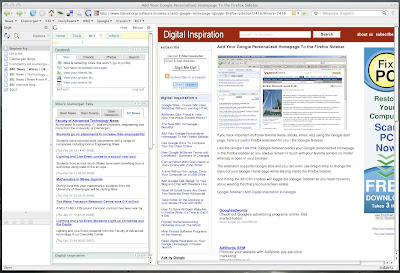It is not only BBC insiders that use the facility, this author is among several who read the flake.
On A Hill has in the past experienced little surges in readership stats when the blog has featured in their Google blog reactions feed.
The BBC are a little upset, concerned, and worried because they have noticed that their PageFlakes page has changed.
New flakes and horror of horrors adverts have appeared.
I went to have a look and have to confess that it took me a while to discover the sponsored flake.
Those of us who spend long periods of time on the Internet do not see adverts. I certainly block them out. They are a nuisance, particularly the flashy ones that vie for attention, but I don't consciously read them.
It may be that they work on me subliminally but I just don't see them. But the fact remains, the BBC sponsored / promoted Pageflakes page is carrying adverts and as we all know the BBC don't do adverts (unless they're advertising their own output).
The BBC are now wondering what's to be done with their Pageflakes page.
I went to look at my Pageflakes, produced as part of a small project I was involved with earlier in the year showcasing Web 2.0 technologies. I also discovered a sponsored flake.
In my case it doesn't matter, my pageflakes were for a small audience (who no longer read the page).
But if my flakes were to be used in the name of the University of Glamorgan, it probably would matter that adverts were appearing on a page linked with our work.
What if I were pulling together environmental feeds and there in the middle of the page appeared an advert for Jaguar cars?
There is no such thing as a free lunch, a free blog, or a free hosted Web 2.0 application.
Recreating the BBC Pageflakes page for private use would not be that difficult for those of us interested in it's content. The feeds could be pulled together on an iGoogle page, in Netvibes, in symbaloo, in SuprGlu, in an ordinary feed reader; the list is endless.
But that's not the point.
If I as a relatively private individual chose to produce a page of feeds related to my interests, say University News Feeds to share with my colleagues I am quite at liberty to use a "free" service such as Pageflakes.
In return I give Pageflakes access to my colleagues, who to Pageflakes are a ready made audience interested in particular topics. But if I then publicise that page to a far wider audience all sorts of problems arise. I wouldn't be at all surprised if such a venture would break some of the University regulations.
The problem faced by the BBC now, is that what was a possibly private internal page of links has been publicised. Perhaps it should have been kept private. Web 2.0 apps are quickly transforming our world but there's always a cost that we don't always see when we come across cutting edge applications.
I guess the BBC Internet Blog shouldn't have an official Pageflakes page.
Powered by ScribeFire.






